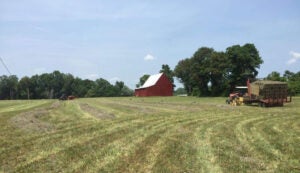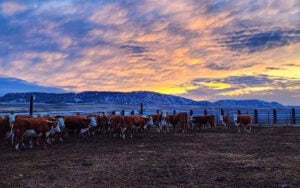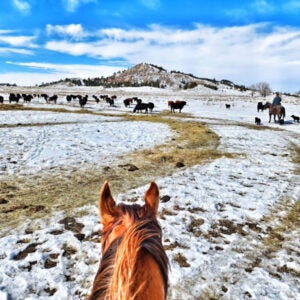Agriculture is a challenging industry, and struggling with mental health can make life even harder. However, there are those in the agriculture industry who have learned how to manage their mental health and thrive, despite the challenges they face.
The names in this article have been changed to protect the privacy of the subjects, but their stories are so important to those of use who work in and around the agricultural sector.
Runs in the family
Cindy’s father became a first-generation Wyoming rancher when she was 2. Today, Cindy (whose name was changed here for privacy) and her husband raise Angus cattle, and her husband has worked as a ranch manager. Cindy has a successful banking career.
Sadly, Cindy’s family also has a history of depression, contributing to her great-grandfather’s suicide during the Great Depression and an uncle who died by suicide when Cindy was in high school.
“My great-uncle and brother both have attempted suicide,” she said. “I also lost a friend to suicide last year.”
This family history caused Cindy to have seasonal depressive disorder and to suffer from post-partum depression after the births of each of her three daughters.
Not all by herself
Beth is the fifth generation to live on her family’s Maryland farm, which comprises 400 acres of grain and hay. Her family works an additional 200 to 300 acres.
Until 2000, the operation raised tobacco. Beth revived her grandfather’s produce operation, expanding from tomatoes, watermelons and cantaloupes to include different heirloom varieties that she sells at farmers markets. Like many families during the COVID-19 pandemic, Beth and her husband got chickens, which quickly grew to a flock of 150. Today, she sells table eggs, hatching eggs, and ready-to-lay pullets.
“I always struggled with depression, but when I was growing up, I didn’t realize that’s what I was struggling with,” Beth says. “Mental health wasn’t talked about at all, and it wasn’t until I was in college that I realized that people see therapists and take medicine. I didn’t know that was a thing — I thought I was having these big anxieties in my own head by myself.”

After moving back to the family farm, Beth got acquainted with other local farmers and saw that many people were struggling with the same things she had battled.
“We’re working for ourselves and feeding the world, so why aren’t we happy all the time?” she says. “A lot of the things we deal with on the farm can be frustrating, especially when it’s something out of your control.”
Although Beth acknowledges that there’s a lot of grit and resilience that goes into taking things as they come in the agriculture industry, it’s still a struggle for many. High input costs, commodities aren’t making enough to balance out those input costs, and some farmers don’t know if they can survive another bad year.
“As a young farmer with a young family, I’m still trying to figure out my place on the farm,” she says. “Will this allow us to continue another 100 years? Is it realistic?”
Beth has talked at length with her parents and others in the agriculture industry, but the stress and questions remain.
Alone time in nature is helpful
“Agriculture is such a small community, but so isolated,” Cindy says. “Our profession is our entire lives.”
Cindy encourages those who live in rural communities — especially women who often also serve as caretakers of the children and household– to find time to pursue individual interests. Cindy prefers to interact with the family’s horses and get contact with the natural world after work.
“It helps a lot of women just to have that breathing time, where nobody’s touching you,” she says. “We cut ourselves short and cheat ourselves out of being our own individual person. Whether it’s being with animals, driving a tractor, reading, or just cleaning without interruptions, you need a break from everything. I’m also a firm believer in fresh air and sunshine.”

Even if you can’t get outside, just having windows that allow morning or afternoon sunshine is helpful, Cindy says. She has even gone so far as to use a tanning bed to get exposure to light.
“Even though it’s frowned upon, I try to push through to the weekend, when I can spend most of my time outside to recharge my batteries,” she says.
Cindy coordinates with her doctor to get regular testing done on her thyroid and vitamin D levels, and takes vitamin D supplements during the winter.
Cindy feels that social media has compounded mental health issues, and she encourages those in the agriculture industry to monitor their alcohol intake.
“If I’m having more than one or two drinks at night, then I really need to step back and evaluate where I’m at mentally, because alcohol is my crutch of choice,” Cindy says. “I can tell if it’s been a long week of gray skies.”
Although Cindy has not used a therapist to work through her mental health challenges, she says she wouldn’t hesitate to do so if she felt she needed it.
“Even in a small town atmosphere, we have pretty good therapists who won’t pass gossip around and don’t know your family and have preconceived notions,” she says. “Tele-health is something good that came out of COVID, because you can find someone web-based who is completely unbiased to your situation.”
Change your mindset
Beth takes medication for her chemical imbalance, which she says helps her be more level-headed, not as frantic and not have big mood swings. She also tries to change her mindset.
“That self-talk, self-empowerment and mindfulness helps a little,” she says. “I try to tell myself that it’s OK that I didn’t get my specialty vegetable seeds planted sooner, because we don’t have a greenhouse. Even if they’re not started on time, I can still get my regular garden plants and have a garden to sell my produce.”
Like many in the agriculture industry, Beth finds that doing something can help take her mind off her struggles, like going outside and cleaning the chicken coop or working on other projects.
“I try to distract myself, get myself active and out of that victim mentality,” she says. “I think that a lot o farmers feel like, if they can just get something done, they’ll feel better.”
Talking to someone is also a big help to Beth, especially other young, female farmers or women who are ag industry professionals in the area. Beth recently had her first baby, so she says it’s helpful to talk with other moms about how to survive new motherhood and still get chores done. Although Beth has quite a few family members around to help, the baby can’t be outside in cold or windy conditions, so the work piles up, adding to her stress.
“Having somebody there to help you through is pretty important in a rural community,” she says. “I try not to stress out my husband, because he works an off-farm shift job and we need his income for our future and finances. I need him to be well rested so he doesn’t burn out and develop mental health issues, too.”
Beth worries about the future, and how she’ll be able to be a full-time farmer and still raise her baby the way she wants to.
Being less judgmental
Cindy believes that the agriculture community is getting better at encouraging those who struggle with mental health, but there’s still a major need for less judgment.
“Sometimes, you can’t just ‘tough it out,’” she says. “There may be some issues with brain chemistry, so talking it out isn’t going to work. We need to be supportive of people. It’s all right to get help. There’s no shame in taking time for yourself.”

Beth would like to see more farm organizations take the lead in helping connect young female farmers, especially those with kids.
“It would be nice if we could benefit from each other’s experiences,” she says.
Sarah Hill is an agricultural writer and communications professional from Hetland, South Dakota. She grew up on a dairy in Missouri and is a 2008 graduate of the University of Missouri with a degree in Agricultural Journalism.



